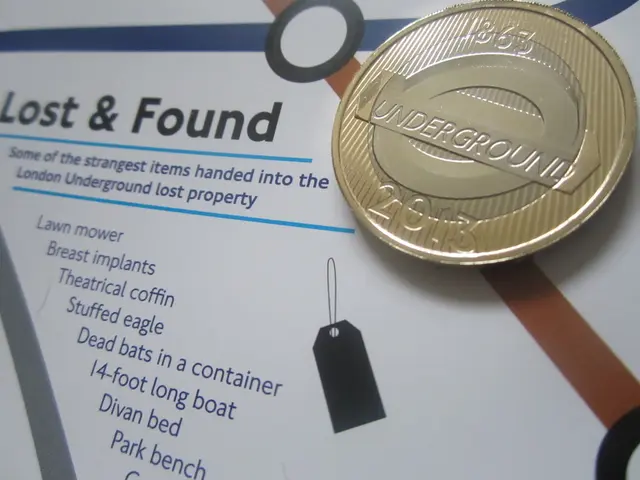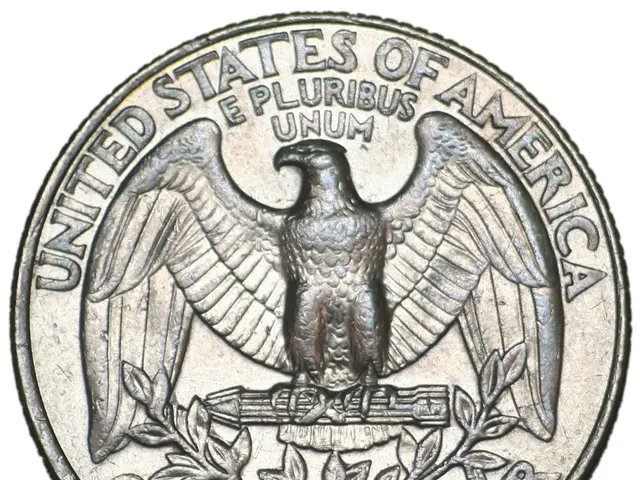Cash ISAs: A Savvy Saver's Tale
Seizing the Opportunity with Cash ISAs: Your Possible Last Chance for 5% Tax-Exempt Savings
The buzz surrounding Cash ISAs is escalating, thanks to whispers about chancellor Rachel Reeves mulling over axing the tax advantages of these popular savings vehicles (see our piece on Reeves's ISA raid).
This commotion might be the wake-up call some savers need to use up their £20,000 yearly ISA allowance before 5 April, which resets at the end of the tax year.
Rumors of tax reforms aren't the only concern on the horizon — the savings rates on cash ISAs have been plummeting recently and are anticipated to continue plunging throughout the year.
Grab Your Slice of the Pie
Now might be your last chance to reap a 5% interest rate on tax-free savings, with the market-leading cash ISA currently offering 5.03% AER. Moving swiftly and placing some cash in a one or two-year fixed-rate cash ISA could help you secure these profits, dodging a potential double-whammy of interest rate cuts and tax reforms.
Data from investment platform Hargreaves Lansdown reveals some savers have already taken advantage of the golden opportunity. This month alone, savers have opened more cash ISAs than regular savings accounts via the platform.
"The trend has kicked off already in February, which isn't usual until mid-March," said Mark Hicks, head of active savings at Hargreaves Lansdown.
Climb the Savings Ladder
Even if the rumored tax changes amount to nothing, savers would do well to make the most of higher savings rates while they last. Although they remain higher compared to their long-term history, cash ISA rates have tumbled over the past year — firstly in anticipation of base rate cuts and now in response to them.
The average rate on an easy-access cash ISA today stands at 3.04% (13 February 2025), a drop from 3.34% on the same day one year ago. The market-leading easy-access cash ISA still offers 5.03% AER (including a 0.13% bonus for 12 months), but it remains uncertain how long such deals will persist.
Most economists predict one rate cut per quarter from the Bank of England, bringing the base rate to 3.75% by the end of the year.
To safeguard your return, consider opting for a fixed-rate account to lock in a guaranteed rate for a specific period, provided you're certain you won't need to access your savings in the interim. The top one and two-year fixed-rate accounts currently offer 4.42% and 4.31% respectively, with no initial opening limit.
Those with larger sums to invest may find even more lucrative options. For example, Caitlyn Eastell, spokesperson at comparison site Moneyfacts, highlights Hodge Bank's two-year fixed-rate cash ISA as one of her top choices. Although Hodge Bank has reduced its rate slightly this week, "the account maintains its position as the market-leader, paying 4.41% on its anniversary," Eastell says. It requires a minimum opening amount of £1,000.
A Storm Brewing?
For now, the predicted changes are merely speculation, driven by reports that big city firms have been pressuring the chancellor to scale back tax incentives for cash savers — part of an effort to channel investment toward the UK stock market instead.
The Treasury refused to comment when our site asked about the matter earlier this week, only saying that they "keep all aspects of savings policy under review."
While the game's still afoot, there are several ways the government could lessen the tax benefits of cash ISAs, from slashing the annual allowance to axing the product altogether. Any restrictions are likely to face resistance, given that over 18 million people have a cash ISA, and over £294 billion was held in this type of account at the end of the 2022/23 tax year according to the latest statistics from HMRC (published in September 2024).
Data from the Bank of England also shows that 2024 was a record year for cash ISAs, with savers depositing over £49.8 billion, up from the previous record of £47.1 billion in 2023.
The popularity of cash ISAs could land them in hot water, with the savings vehicle becoming a target for government ministers and city firms alike. Economic secretary to the Treasury, Emma Reynolds, recently stressed the need to move away from hoarding billions in cash ISAs. "We have failed to create an investment culture that we see in other places, allowing people to invest their money," she said.
The stock market generally outperforms cash returns over the long run, but only if savers invest wisely in a well-diversified portfolio of companies. However, for many savers, it's not an either-or situation when it comes to cash versus stocks and shares ISAs. A cash ISA is often the right choice for short-term savings goals, whereas a stocks and shares ISA can serve as a tool for building long-term wealth.
- Despite rumors of potential tax reforms and decreasing savings rates, savers are taking advantage of the high interest rates on market-leading cash ISAs, with some opting for fixed-rate cash ISAs to secure profits.
- For those with larger sums to invest, top choices for two-year fixed-rate cash ISAs include Hodge Bank's offering of 4.41%, requiring a minimum opening amount of £1,000.
- The government could lessen the tax benefits of cash ISAs by slashing the annual allowance or axing the product altogether, although any restrictions are likely to face resistance due to the popularity of cash ISAs.
- In light of the ongoing debate about tax advantages of cash ISAs and the increasing pressure from big city firms, it's important for savvy savers to keep abreast of updates in personal-finance, technology, and social-media to make informed decisions regarding their investments in property, finance, entertainment, and other aspects of their lives.








